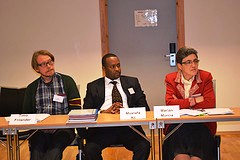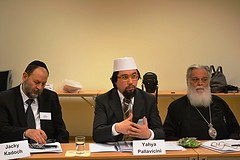Bishop Gunnar Stålsett led an ECRL delegation including Sheikh Ibrahim Mogra, Sister Marian Murcia, Professor Senaid Bülent, Mr. Vakhtang Kipshidze, and General Secretary Stein Villumstad to Kyrgyzstan 19 – 22 December. The visit was a follow up of a January 2011 delegation visit and conference, which encouraged ECRL to accompany Kyrgyz religious leaders in their efforts to contribute to reconciliation and nation building in the aftermath of violent conflicts in their country.
|
DIFFERENT FAITHS- COMMON ACTION |
ECRL delegation on a year-end solidarity visit to
Bishop Gunnar Stålsett led an ECRL delegation including Sheikh Ibrahim Mogra, Sister Marian Murcia, Professor Senaid Bülent, Mr. Vakhtang Kipshidze, and
All of this will hopefully give incentives to our Kyrgyz partners for a continued process of inter-religious cooperation for reconciliation between groups and communities, compassion with the vulnerable groups and constructive engagement with authorities in building the Kyrgyz nation. Dialogue on “Arab Spring” process as it unfolds
The Consultation which gathered some twenty religious leaders at Stiklestad National Culture Centre in Norway to elaborate on the processes going on in the “Arab Spring” during the days 10 and 11 January 2012 from the Middle East and North Africa (MENA) region as well as representatives of Africa and Europe to explore challenges and possibilities in the nation building following the “Arab Spring”. This consultation is part of a Religions for Peace process that started with a meeting of the MENA Council of Religions for Peace in
Organised by European Council of Religious Leaders (ECRL), the consultation focused on challenges and opportunities emerging from the revolutions and upheavals that have taken place in a number of Middle Eastern and North African countries during this last one year, and that are still unfolding. We noted the significance of popular participation and the role of women and youth as one of the main features of the revolutions. We further examined the role of religious leaders in relationship to their own communities, to other religious communities, political authorities and the movements of change. The consultation also discussed the European response to the “Arab Spring”, and explored possible ways of constructive interaction between religious leaders and their communities that may transcend national and regional borders.
The participants committed themselves whole-heartedly to engage with others in promoting democratic development, human rights, social justice and human dignity in their own countries and the region.



